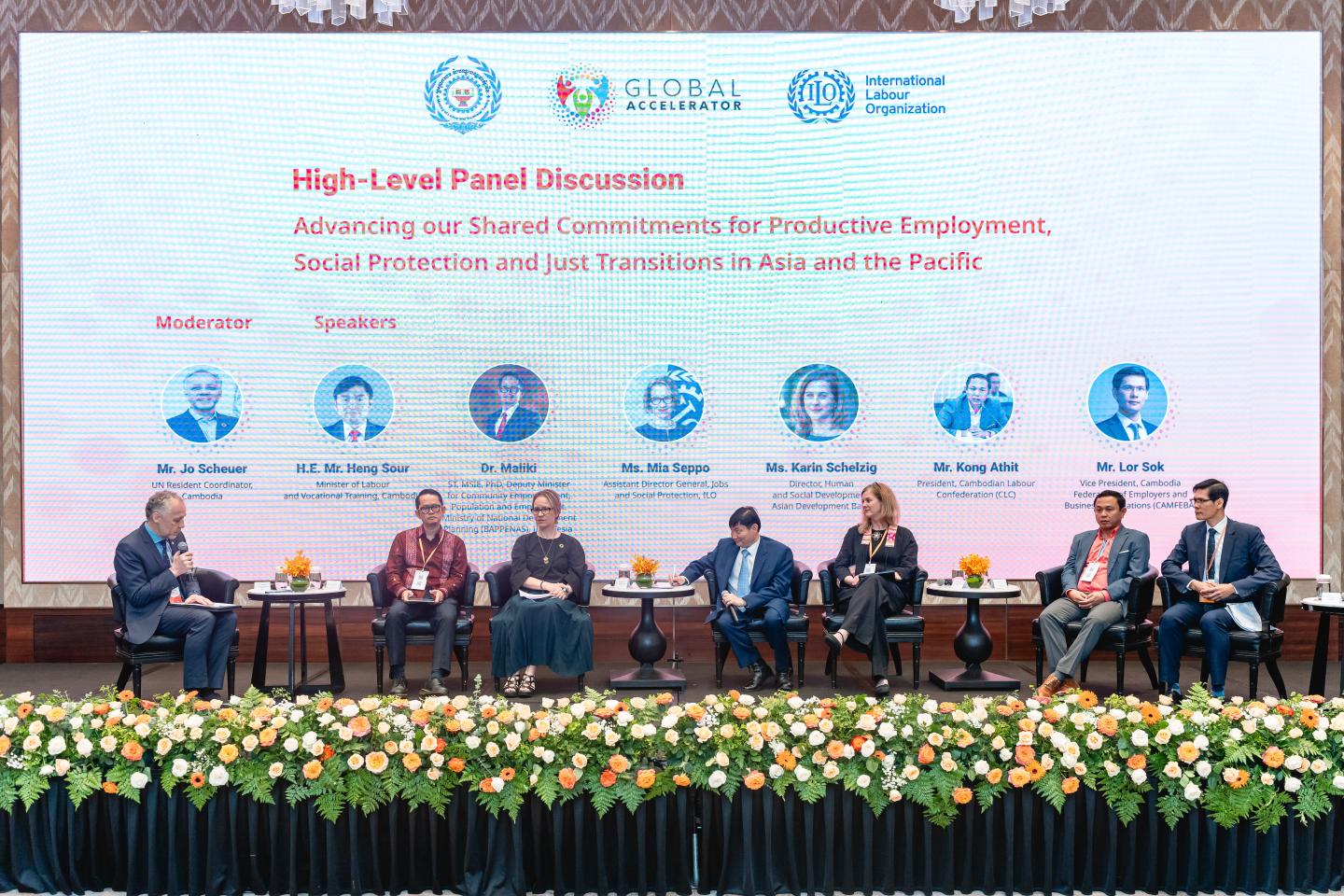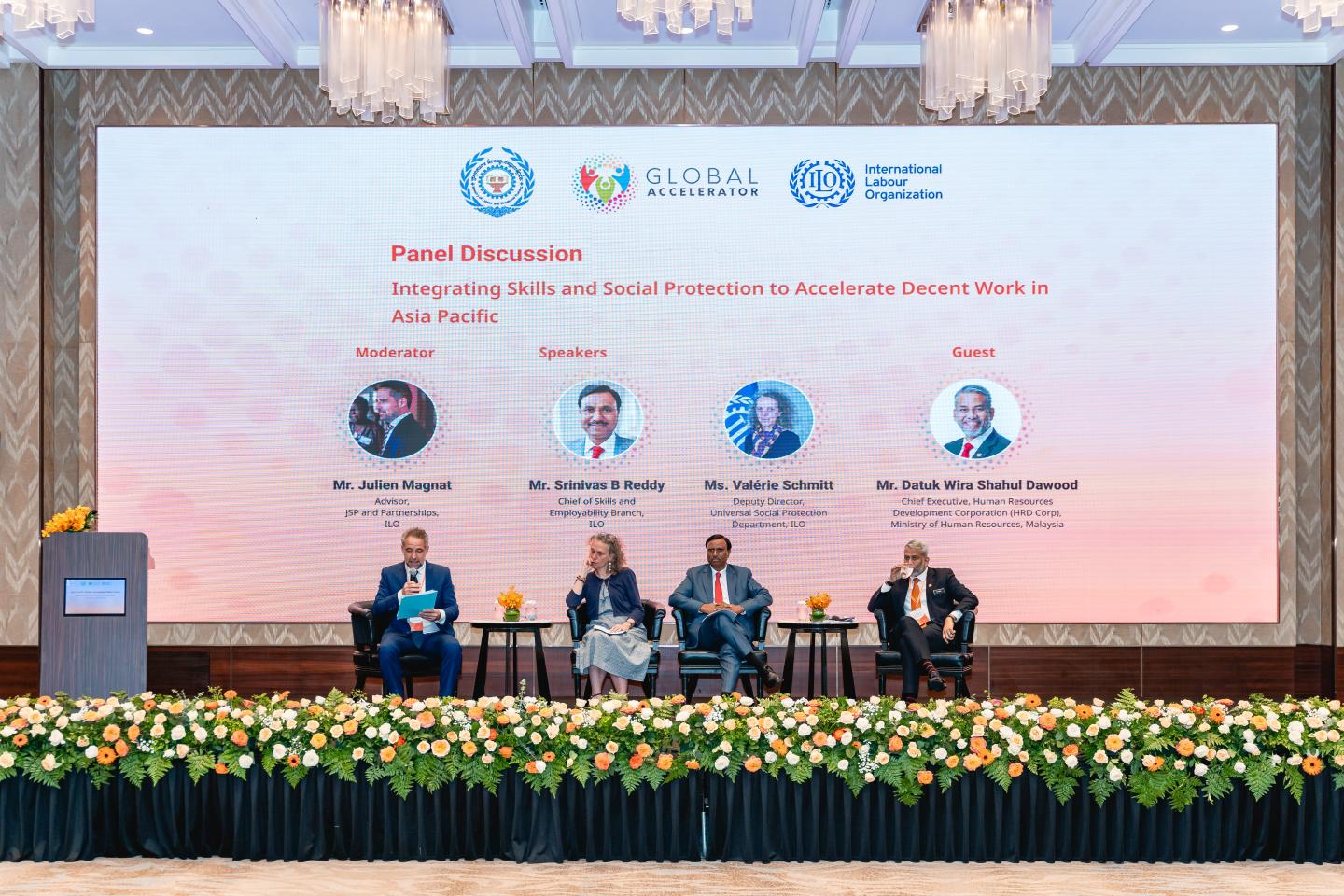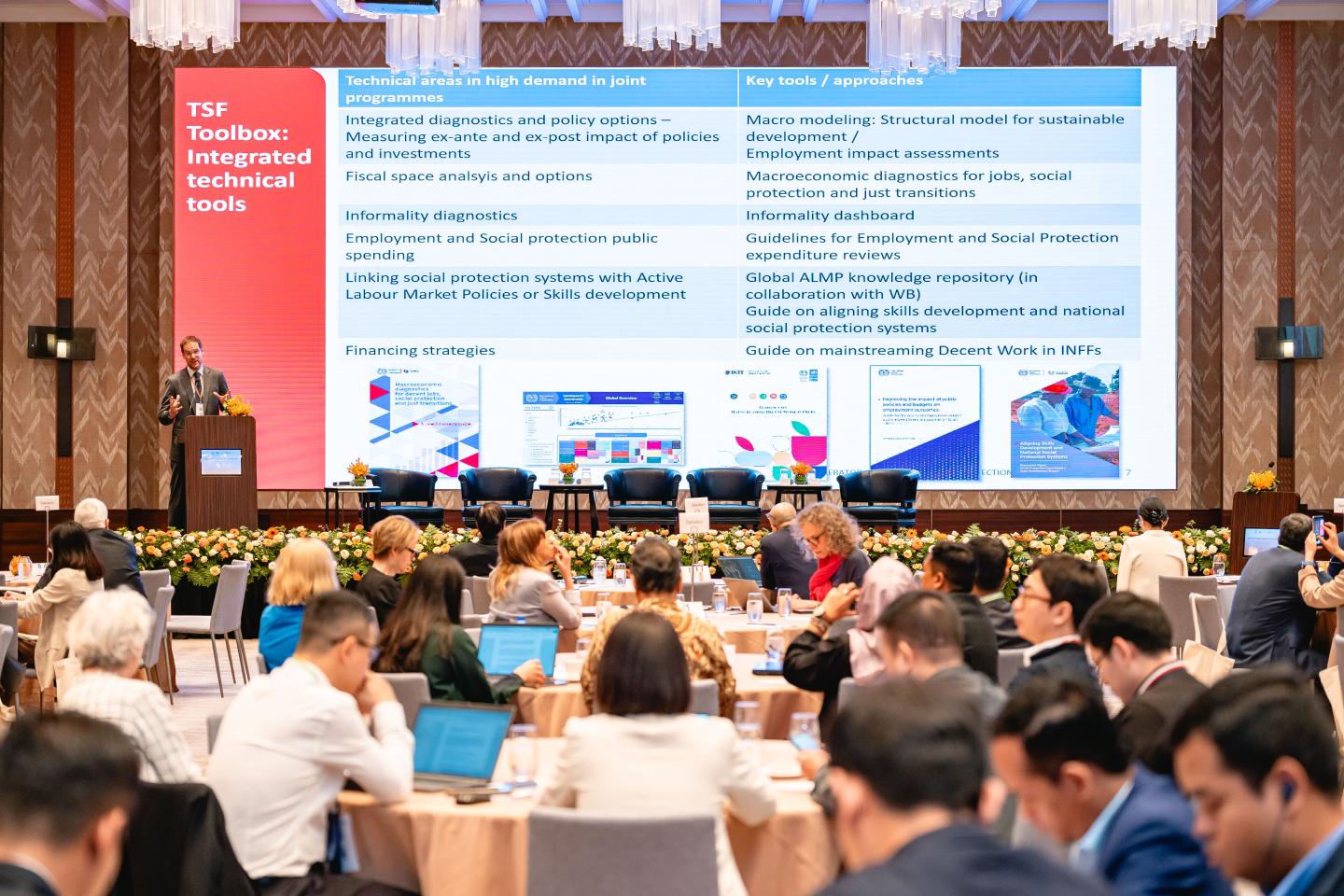Pathfinder countries met to share experiences and reinforce commitment to decent work, social protection, skills and just transitions.
Phnom Penh - Facing formidable challenges of high-informality, poverty, skills gaps and low productivity, developing economies in Asia and the Pacific discussed the importance of tripartite dialogue and a whole of government approach to enhance social protection, skills development and employment during the Asia Pacific Global Accelerator Policy Forum: Meeting the Commitments for Productive Employment and Universal Social Protection held in Cambodia on 8-9 April 2025.

Co-hosted by the International Labour Organization and Ministry of Labour and Vocational Training of Cambodia, the forum brought together representatives of Governments and social partners from six pathfinder countries - Cambodia, Indonesia, Nepal, Pakistan, the Philippines and Viet Nam – alongside UN agencies, the Asian Development Bank (ADB) and the World Bank. It provided impetus to efforts to build stronger knowledge, policies and partnerships on shared priorities for achieving just transitions in the face of economic, digital, climate and demographic changes.
During the event, participants explored how to translate the Global Accelerator's three supportive pillars into national strategy and policy frameworks for decent employment and universal social protection in a world increasingly shaped by geopolitical tensions, climate change, demographic shifts and digital disruption.
"Globally, uncertainties are high, which can derail global socio-economic growth, making the Asia Pacific Global Accelerator Policy Forum a step in the right direction. It is a testament to the continued commitment and value placed on cooperation to achieve the Sustainable Development Goals for the Pathfinder countries and the whole world," said H.E. Akka Pundit Sapheacha Aun Pornmoniroth, Deputy Prime Minister and Minister of Economy and Finance of Cambodia, at the opening session of the forum.
High-level discussions over the two days underscored how decent jobs and universal social protection align with national efforts to reduce poverty, strengthen formal economies and equip workers with future-ready skills that enable just transitions.

ILO Assistant Director-General for Jobs and Social Protection, Mia Seppo, highlighted that the Global Accelerator is “not a new initiative but an amplifier” of the existing initiatives and priorities of the countries to conceptualise cohesive, data-driven roadmaps for action. “We are seeing real evidence of how the global accelerator is adding value, how it is nationally owned and aligned with national plans and sectoral policies, and how the countries are learning from one another through this growing network,” she added.
Although the participating countries are navigating diverse national contexts – from low female labour force participation in Pakistan, an ageing population in Viet Nam, LDC graduation processes in Nepal and Cambodia, to the impacts of climate risk in Indonesia and the Philippines – several common challenges emerged. These include persistently high informality, fiscal constraints and structural exclusions in labour markets and from social protection.
Discussions called for strengthened South–South cooperation for skills development and policy exchange as well as expanded social protection systems that respond effectively to shocks and disasters. The care economy was highlighted as a social and economic priority to increase female labour force participation as was the need to leverage the potential offered by green and digital transitions.
Throughout the forum, the urgency of sustainable financing was a recurring theme. Participants emphasised the need for innovative financing approaches, including impact investment and blended finance models, which can be unlocked by countries building on their current momentum.
“The Global Accelerator's fuel is financing. The country roadmaps are great unifying frameworks and a way to harmonize approaches for coherent interventions around jobs and social protection,” shared Karin Schelzig, Director, Human and Social Development, Asian Development Bank. She further stated that long term poverty reduction requires integrated labour market policies that balance workforce productivity, skills training and requisite monetary support to ensure the holistic graduation of people and economies out of multidimensional poverty.
Representing workers, Anne Colina from the Federation of Free Workers Philippines, underscored the importance of workers’ participation in the process: “What is unique about the Global Accelerator is that it's not a top-down policy, it's bottom-up. That's why trade unions and workers’ associations should actively be engaged and not just recipients of these policies.”
“The Global Accelerator is a catalytic platform to unite tripartite constituents to accelerate progress towards decent work,” said H.E. Sovann Vannaroth, Permanent Secretary of State at the Ministry of Labour and Vocational Training (MLVT), as a summation of the event.

A number of outcomes and key recommendations emerged from the Forum that will be turned into follow-up actions. These included:
- to support structured engagement with pathfinder countries to maintain and foster knowledge exchanges and south-south collaboration on the Global Accelerator in the region.".
- To increase the number of partners and countries supporting the Global Accelerator, through joint advocacy and messaging on the value addition of the initiative.
- To ensure the participation of social partners and civil society and support their capacity to engage in policy dialogue, in recognition that social dialogue is a cornerstone of the Global Accelerator.
- To further document and invest in knowledge and research on the multiplier effects and socio-economic dividends of policies and programmes which integrate skills development and social protection, especially in the informal economy.
- To ensure that policy measures and programmes identified in national roadmaps are clearly reflected in, and supported by, national financing strategies.
- To break silos between policy makers and financiers and involve more partners to support technically and financially the implementation of national roadmaps and agreed acceleration points whether these are policy oriented, sectoral, or focusing on specific groups.
Read the full report from the event here.